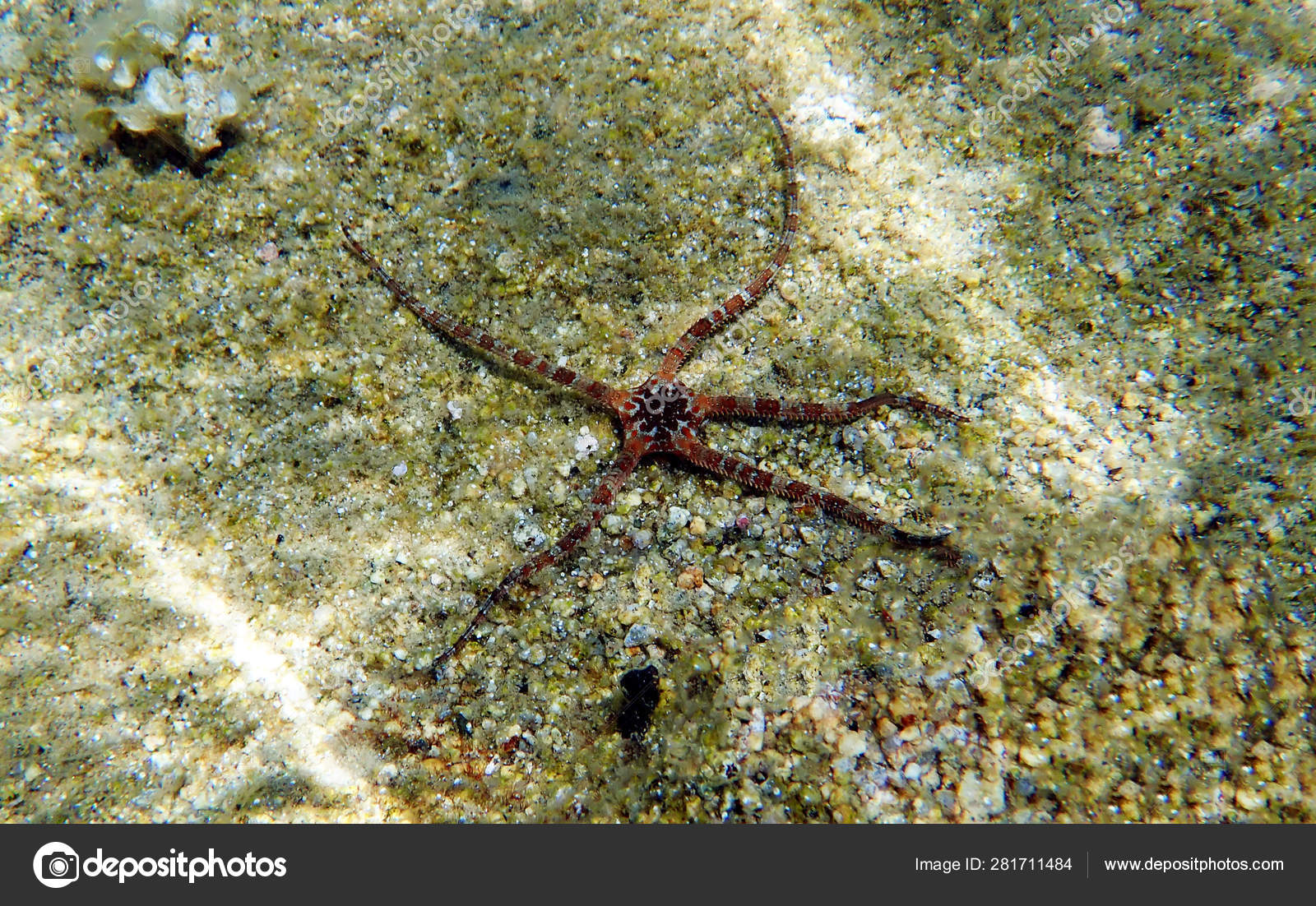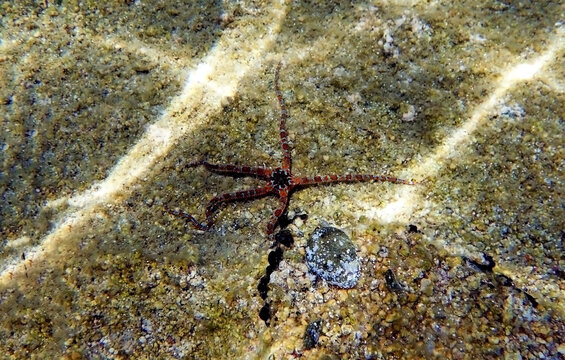38 brittle star diagram
brittle star, also called serpent star, any of the 2,100 living species of marine invertebrates constituting the subclass Ophiuroidea (phylum Echinodermata). Their long, thin arms—usually five and often forked and spiny—are distinctly set off from the small disk-shaped body. The arms readily break off but soon regrow— i.e., are regenerated. Brittle Stars pocesses a skeleton made of calcium-cabonate in the form of calcite. These calcite ossicles are fused together to form armor plates. These plates are covered with epidermis (skin) to create a smooth, strong covering.
Learn brittle star with free interactive flashcards. Choose from 37 different sets of brittle star flashcards on Quizlet.

Brittle star diagram
In this article we will discuss about the structure of Brittle Star (Opheolepis) with the help of a diagram. 1. It is commonly known as "brittle star" and is found in shallow sea-waters. It is usually green in colour. 2. Body comprises of a distinct pentagonal disc and 5 narrow flexible jointed and slender arms radiating from it. ADVERTISEMENTS: 3. Western Spiny Brittle Star diagram Western Spiny Brittle Star Stats. Description: Spiny. Orange, yellow, tan, brown, green, variously patterned. Long, thorny spines on margins of arms and disk. Size: Disk diameter ¾ in (19 mm), arm length 6 in (15 cm) Sea stars (also known as starfish) are spiny, hard-skinned animals that live on the rocky sea floor. These invertebrates are NOT fish; they are echinoderms. Two starfish diagrams, produced with the code found on schematron.org iraklis_k/starfish, are shown in Fig. 1. Each arm is labelled with a shorthand title. Starfish Anatomy Labeling Page. Link to More Info About this Animal …
Brittle star diagram. Download scientific diagram | Brittle stars collected from hawksbill turtle; a) Brittle star species I with clear dark spots; b) disk close up of brittle star species II; c) brittle star species II. Ophiothrix fragilis is a species of brittle star in the order Ophiurida. It is found around the coasts of western Europe and is known in Britain as the ... Deuterostomia. Click on an image to view larger version & data in a new window. This tree diagram shows the relationships between several groups of organisms. The root of the current tree connects the organisms featured in this tree to their containing group and the rest of the Tree of Life. The basal branching point in the tree represents the ... Brittle stars, serpent stars, or ophiuroids (from Latin ophiurus 'brittle star'; from Ancient Greek ὄφις (óphis) 'serpent', and οὐρά (ourá) 'tail'; referring to the serpent-like arms of the brittle star) are echinoderms in the class Ophiuroidea, closely related to starfish. They crawl across the sea floor using their flexible arms for locomotion. The ophiuroids generally have five long, slender, whip-like arms w…
Sea stars are echinoderms, which means they are related to sea urchins, sand dollars, basket stars, brittle stars, and sea cucumbers. All echinoderms have a calcareous skeleton covered with skin. They also usually have spines. Here you will learn about the basic aspects of sea star anatomy. Also known as brittle stars or serpent stars, ophiuroids have long sinuous arms sharply demarcated from the central disk. The arms contain vertebra-like ... 25.11.2021 · Brittle Star Anatomy Diagram Wiring Diagram Images Gallery These spines are in turn covered with very small hairs cilia. Sand dollar anatomy. Sand dollar they have a rigid skeleton made of calcium carbonate plates and this skeleton is covered by small velvet textured spikes that give them the smooth feel. A material is brittle if, when subjected to stress, it … Brittle Star Printout. Brittle Stars are invertebrates (echinoderms) that live on the sea floor. Brittle stars have radial symmetry and long arms.
Fig. 1 Early stages of arm regeneration in the brittle star Amphiura filiformis. A) Schematic diagram of early arm regeneration stages and average timing to those stages, based on morphological landmarks. Stage 1-wound healing and re-epithelialization. Stage 2-regenerative bud formation. Download scientific diagram | Global distribution of described species of Ophiuroidea, based on Table 2. from publication: Global Diversity of Brittle Stars (Echinodermata: Ophiuroidea) | This ... Download scientific diagram | Diversity of brittle stars. A. Ophiolepis superba , a typical five-armed form with simple arms; B. Ophiacantha enopla veterna , a form with long serrated arm spines ... Also known as Black Brittle Star, Brittle Sea Star, Brittle Star, Brittle Starfish, Elegant Brittle Starfish, Snake Brittle Star, Starfish, Variable Brittle Star. Found in crevices, holes, wrapped around corals, over coral and rocky reefs. Long arms covered in soft spikes, looks like a toilet brush! They feed on detritus and plankton.
Asexual reproduction is a form of reproduction that requires only one parent and makes identical clones of the parent. Fell,
Ophiura (Brittle star): Brittle stars also swim like snake with their arms. Anus is absent. Echinus (Sea urchin): It moves with the help of spines. The sea urchin has a masticatory apparatus, called Aristotle’s Lantern because of its resemblance to ancient Greek ship lantern. It is formed by five strong and sharp teeth. Cucumaria (Sea cucumber): The sea cucumbers respire by respiratory ...
This round, specialized plate allows water to enter the water vascular system. In sea stars, it's located on the "top" (or aboral, meaning opposite of the side of the mouth). In brittle stars, it's located on the "bottom" (or oral side). But, let's be honest—it's way easier to tell them apart by looking at their arms (see above). There you have it!
Brittle stars regenerate their whole arms post-amputation. Amphiura filiformis can now be used for molecular characterization of arm regeneration due to the availability of transcriptomic data. Previous work showed that specific developmental transcription factors known to take part in echinoderm skeletogenesis are expressed during adult arm regeneration in A. filiformis; however, the process ...
Download scientific diagram | 11 Brittle star development. (A) Eight-cell stage showing unusual germ layer-specific contributions of each lineage (see color code). Vegetal pole is down. (B ...
BRITTLESTAR – The Internet's Favourite Dad* (*unproven) Entertain first. Sell second. Brittlestar has created viral videos for global brands like KFC, Walmart, Subway, ROGERS, and more. Find out more about Branded Content. Speaking. From keynotes, moderating or panels, Brittlestar has been invited to conferences to share his insight in Canada ...
A brittle star is made up of an obvious central disk and five or six arms. The central disk is small and clearly offset from its arms, which are long and slender. They have tube feet on their underside, like sea stars, but the feet do not have suction cups at the end and are not used for locomotion—they are used for feeding and to help the brittle star sense its environment. Like sea stars, brittle stars have a vascular system that uses water to control locomotion, respiration, and food and waste transportation, and their tube feet are filled with water. A madreporite, a trap door on the brittle star's ventral surface (underside), controls the movement of water in and out of the star's body. Within the central disk lie the brittle star's organs. Although brittle stars don't have brains or eyes, they do have a large stomach, genitals, muscles, and a mouth surrounded by five jaws. A brittle star's arms are supported by vertebral ossicles, plates made from calcium carbonate. These plat...
Figure 1: This diagram shows the anatomy of a sea star. ... Ophiuroidea (brittle stars), Echinoidea (sea urchins and sand dollars), Crinoidea (sea lilies or feather stars), and Holothuroidea (sea cucumbers) (). Perhaps the best-known echinoderms are members of the class Asteroidea, or sea stars. They come in a large variety of shapes, colors ...
5.1 General Explanation. The class Ophiuroidea is divided into two orders, Ophiurida, the brittle stars, and Euyalida, the basket stars. This section focuses on the more prevalent brittle stars. Brittle stars arguably are the most diverse group of echinoderms, exhibiting an extensive array of distinct reproductive and developmental modes, which ...
brittle star, the main focus of this study. In . O. esmarki, an abbreviated mode of development can be studied and compared to the ancestral mode of development to view the evolutionary changes in neural formation. This abbreviated mode of development is found in five other families of brittle stars, but very little is known about it. The . O ...
Brittle stars belong to the class Ophiuroidea. Unlike sea stars, which have plump arms, brittle stars have long, thin arms that are sharply demarcated from the central disk. Brittle stars move by lashing out their arms or wrapping them around objects and pulling themselves forward. Sea urchins and sand dollars are examples of Echinoidea.
Asteroideas: these are the true sea stars and sun stars. Ophiuroideas: these are the brittle stars and basket stars. Asteroideas Ophiuroideas The differences between the two sub-types lies in how the arms connect to the central disk. ... Use your diagram sheets and the pictures below to identify the following structures:
Figure 1: This diagram shows the anatomy of a sea star. ... Ophiuroidea (brittle stars), Echinoidea (sea urchins and sand dollars), Crinoidea (sea lilies or feather stars), and Holothuroidea (sea cucumbers) (Figure 2). Perhaps the best-known echinoderms are members of the class Asteroidea, or sea stars. They come in a large variety of shapes ...
Since brittle stars do not have any suction cups at the ends of their tube feet, they probably cannot be used for food gathering, only for respiration and locomotion. F Adult tunicates show no indication that they are chordates.
Sea stars (also known as starfish) are spiny, hard-skinned animals that live on the rocky sea floor. These invertebrates are NOT fish; they are echinoderms. Two starfish diagrams, produced with the code found on schematron.org iraklis_k/starfish, are shown in Fig. 1. Each arm is labelled with a shorthand title. Starfish Anatomy Labeling Page. Link to More Info About this Animal …
Western Spiny Brittle Star diagram Western Spiny Brittle Star Stats. Description: Spiny. Orange, yellow, tan, brown, green, variously patterned. Long, thorny spines on margins of arms and disk. Size: Disk diameter ¾ in (19 mm), arm length 6 in (15 cm)
In this article we will discuss about the structure of Brittle Star (Opheolepis) with the help of a diagram. 1. It is commonly known as "brittle star" and is found in shallow sea-waters. It is usually green in colour. 2. Body comprises of a distinct pentagonal disc and 5 narrow flexible jointed and slender arms radiating from it. ADVERTISEMENTS: 3.

Comments
Post a Comment